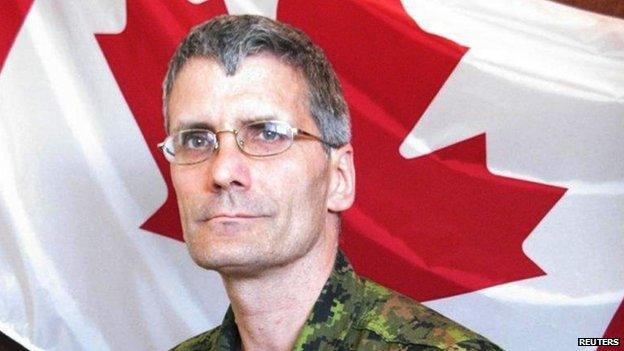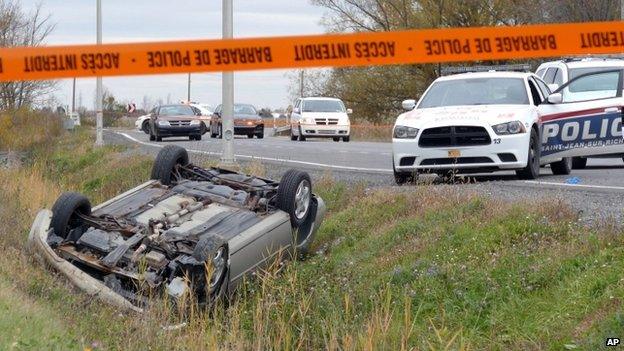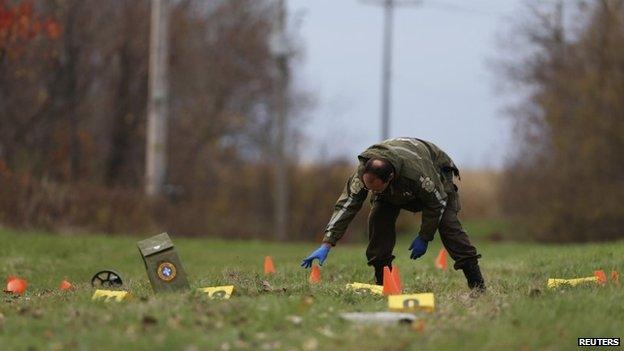Hit-and-run soldier killer in Canada had passport seized
- Published

The slain soldier, Vincent, was a 28-year veteran of the Canadian military
The passport of a man who struck two Canadian soldiers with his car, killing one of them, had been seized by police investigating suspected terror links.
Authorities say Martin Couture-Rouleau, 25, was one of 90 militants being tracked.
The Muslim convert was killed by officers at St-Jean-sur-Richelieu after hitting the two men.
Public Safety Minister Steven Blaney labelled the attack a "terrible act of violence against our country".
On Tuesday, the dead soldier was identified as Warrant Ofc Patrice Vincent, 53, a 28-year veteran of the Canadian armed services. The other soldier suffered minor injuries, police said.
Royal Canadian Mounted Police (RCMP) Commissioner Bob Paulson said authorities had been tracking the group - including Couture-Rouleau - because they may have intended to go abroad to join militant groups.
RCMP Supt Martine Fontaine said authorities seized Couture-Rouleau's passport in July when he tried to travel to Turkey. He was arrested but police lacked evidence to charge him with a crime.
Supt Fontaine said authorities had met him several times, most recently on 9 October, and had met his parents and the imam at his mosque in an effort to get him to change his views.

The man fled the scene, then crashed his car and was shot after he got out, police said
"Many interventions with him were carried out to try and avoid the tragic events," Supt Fontaine told reporters on Tuesday. "It's very difficult when someone is planning an act alone and there is no obvious preparation involved and used a vehicle as a weapon."
On Monday, Couture-Rouleau ran down Warrant Ofc Vincent and another man in a car park serving a Canadian military office in the Quebec town of St-Jean-sur-Richelieu about 40km (25 miles) south-east of Montreal.
He had been waiting in his car for as long as two hours before the attack, Quebec Police spokesman Guy Lapointe said.

Lee Carter, BBC News, Toronto
The attack comes as a shock but not a surprise to many Canadians. In recent years this country has, sometimes controversially, shed its image as neutral peacekeeper in foreign conflicts and has also worked ever-closer with US authorities to combat terror threats.
Earlier this month the country's parliament voted in favour of sending fighter jets and military personnel to join in the US-led combat operation against IS in Iraq.
Although terror attacks in Canada have been rare, a number of plots have been thwarted. The most notorious was the so-called Toronto 18 case in 2006, where a group of al-Qaeda-inspired extremists were convicted of planning to attack a number of targets, including the parliament buildings.
Nevertheless, critics have accused both the police and the intelligence agencies of being slow to respond to the more recent challenge posed by ever-sophisticated extremist propaganda.


A Surete du Quebec officer investigates the scene
After striking the officers, Couture-Rouleau fled and was chased by police at high speed for about 4km (2.5 miles), until the car drove off the road and rolled over several times.
He then left the car brandishing a knife, and police opened fire. Couture-Rouleau was taken to hospital where he died some hours later.
A neighbour of Couture-Rouleau told the Associated Press news agency he had known the man since he was a child, and that in the past year he had grown a beard and begun wearing loose-fitting Muslim clothing.